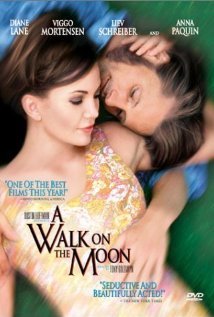
| None | Light | Moderate | Heavy | |
|---|---|---|---|---|
| Language | ||||
| Violence | ||||
| Sex | ||||
| Nudity |
Content:
Mostly pagan worldview of irresponsible woman who commits adultery with a moral conclusion plus some occult fortune telling elements; 13 obscenities & 6 profanities but child rebukes parent for using foul language; brief act of violence where man strikes man; two depicted drawn out scenes of adultery, married couple makes out in car, adulterous kissing, & some sexual talk & humor among teens; full male & full female nudity but no genitalia shown, women in underwear & bikinis; alcohol use; smoking & marijuana use; and, gross scene where young teen girl shows bloody underwear, evidence of her first period.
More Detail:
Looked on with hindsight, the Turbulent 1960s seems more like a decade of mass confusion rather than the exciting, insightful era it is often portrayed. A WALK ON THE MOON, a new movie set in 1969, seems to reflect this quality.
Diane Lane stars as Pearl Kantrowitz, a beautiful, young Jewish housewife who feels that exciting times are passing her by. In the summer of 1969, the Apollo Mission is on its way to the moon and the war in Vietnam is raging. Flower power is in, and the Establishment is out. Pearl is en route to Dr. Fogler’s Bungalows, a Catskills summer resort. In tow are her children, adolescent daughter Alison (Anna Paquin) and precocious young son Daniel, as well as their tarot card reading/tea leaf reading grandmother. Their life hasn’t changed a bit. Ice cream is dolled out daily, children swim daily and the ladies cook and talk among themselves. Staying at home is her husband Marty (Liev Schreiber), an admittedly square but devoted television repairman to whom Pearl fears she was married far too young and far too soon.
The only outside visitors to the resort are traveling salesmen who show up each day. There’s the “Knish Man,” “the Ice Cream Man” and then there is “the Blouse Man,” Walker Jerome (Viggo Mortensen), a charming and quietly seductive hippie. In spite of herself, Pearl is drawn to Walker. She makes frequent visits to his mobile store, and, on the night of the moonwalk, with Marty still at home, she starts an adulterous affair. Meanwhile, her daughter is exploring her own sexuality with kissing boys.
The grandmother knows that something is amiss and asks Marty to come over as soon as possible. Marty does come, but only after Alison sneaks away with her boyfriend and Pearl sneaks away with Walker, both to visit the Woodstock music festival. At the music festival, Alison sees her mother enjoying life in the arms of another man, and runs away in disgust and anger. After the show, Marty discusses the affair with Pearl at the resort. Tempers flair, Alison displays great confusion and Pearl lets it known that her dreams have been squashed. Through more discussions, fights and circumstances, Marty and Pearl work toward reconciliation.
Despite the fun costumes, and period music, this movie remains a dud from the start. The writing, though not stupid, is lazy. All the actors do well with the material, but none can rise above the weak written words.
The treatment of adultery and its aftermath seems copied from other, better films. The only thing new is setting it in the tumultuous sixties. Mortensen as the seductive hippie seems cookie-cutter sexy, and Schreiber seems by-the-book nerdish. (If they switched roles, that might have been more interesting.) Paquin, though having a minor role, pads her resume and ages with grace, showing that her future screen presence seems assured.
Though the movie’s resolution is moral, with the marriage under reconstruction, the adulterous sex scenes are spiced up and made to appear attractive and exciting. Meanwhile, the married couple’s romancing seems forced and even amusing. Hence, the assumption is that even though Pearl is making the right moral choice in the end, she would have had more fun in the affair. Perhaps more alarming, however, is the fact that the moral center of the family, the grandmother, is a fortune teller who plies her trade with cards and tea leaves. She is viewed as respectable and level-headed, yet her occupation is evil, certainly not respected among the Jewish faith.
Attempting nostalgia, social commentary, sexual commentary, and poignant drama all at once, A WALK ON THE MOON only marginally achieves its goals in its exploration of adultery during the late 1960s. A low-budget period piece, this sleepy story offers little insight or intrigue. It is a lightweight examination of adultery, with seemingly quick and contrived answers and solutions. Costumes, music and a moral conclusion don’t help this passing, forgettable drama, which would be buried under any summer popcorn movie, or winter Academy-award contender.
Diane Lane stars as Pearl Kantrowitz, a beautiful, young Jewish housewife who feels that exciting times are passing her by. In the summer of 1969, the Apollo Mission is on its way to the moon and the war in Vietnam is raging. Flower power is in, and the Establishment is out. Pearl is en route to Dr. Fogler’s Bungalows, a Catskills summer resort. In tow are her children, adolescent daughter Alison (Anna Paquin) and precocious young son Daniel, as well as their tarot card reading/tea leaf reading grandmother. Their life hasn’t changed a bit. Ice cream is dolled out daily, children swim daily and the ladies cook and talk among themselves. Staying at home is her husband Marty (Liev Schreiber), an admittedly square but devoted television repairman to whom Pearl fears she was married far too young and far too soon.
The only outside visitors to the resort are traveling salesmen who show up each day. There’s the “Knish Man,” “the Ice Cream Man” and then there is “the Blouse Man,” Walker Jerome (Viggo Mortensen), a charming and quietly seductive hippie. In spite of herself, Pearl is drawn to Walker. She makes frequent visits to his mobile store, and, on the night of the moonwalk, with Marty still at home, she starts an adulterous affair. Meanwhile, her daughter is exploring her own sexuality with kissing boys.
The grandmother knows that something is amiss and asks Marty to come over as soon as possible. Marty does come, but only after Alison sneaks away with her boyfriend and Pearl sneaks away with Walker, both to visit the Woodstock music festival. At the music festival, Alison sees her mother enjoying life in the arms of another man, and runs away in disgust and anger. After the show, Marty discusses the affair with Pearl at the resort. Tempers flair, Alison displays great confusion and Pearl lets it known that her dreams have been squashed. Through more discussions, fights and circumstances, Marty and Pearl work toward reconciliation.
Despite the fun costumes, and period music, this movie remains a dud from the start. The writing, though not stupid, is lazy. All the actors do well with the material, but none can rise above the weak written words.
The treatment of adultery and its aftermath seems copied from other, better films. The only thing new is setting it in the tumultuous sixties. Mortensen as the seductive hippie seems cookie-cutter sexy, and Schreiber seems by-the-book nerdish. (If they switched roles, that might have been more interesting.) Paquin, though having a minor role, pads her resume and ages with grace, showing that her future screen presence seems assured.
Though the movie’s resolution is moral, with the marriage under reconstruction, the adulterous sex scenes are spiced up and made to appear attractive and exciting. Meanwhile, the married couple’s romancing seems forced and even amusing. Hence, the assumption is that even though Pearl is making the right moral choice in the end, she would have had more fun in the affair. Perhaps more alarming, however, is the fact that the moral center of the family, the grandmother, is a fortune teller who plies her trade with cards and tea leaves. She is viewed as respectable and level-headed, yet her occupation is evil, certainly not respected among the Jewish faith.
Attempting nostalgia, social commentary, sexual commentary, and poignant drama all at once, A WALK ON THE MOON only marginally achieves its goals in its exploration of adultery during the late 1960s. A low-budget period piece, this sleepy story offers little insight or intrigue. It is a lightweight examination of adultery, with seemingly quick and contrived answers and solutions. Costumes, music and a moral conclusion don’t help this passing, forgettable drama, which would be buried under any summer popcorn movie, or winter Academy-award contender.


 - Content:
- Content: 

